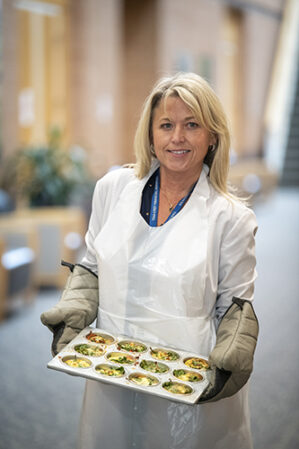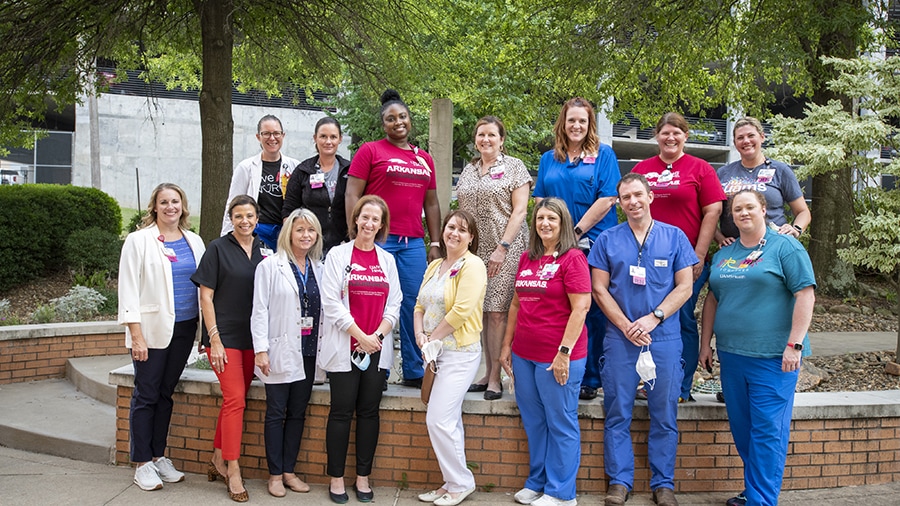By Ben Boulden
July 22, 2022 | The UAMS Culinary Medicine Kitchen offers Team UAMS members like Dees Davis, RN, an opportunity to eat what they have learned at the end of a class.
As part of a nurses’ retreat, Davis, a clinical services manager in the UAMS Medical Center, and about two dozen of her nursing colleagues participated in a 90-minute Culinary Medicine class. The nurses paired up and then chose to prepare either breakfast, lunch or dinner. Each meal included three easy-to-prepare recipes.
Davis said she wasn’t sure what the class would involve, and half expected a demonstration and nutritional education presentation.

“I was pleasantly surprised when I realized we were going to cook and get our hands dirty,” Davis said. “It was a lot of fun. I was also surprised how easy it was to put together some of these meals. These recipes I had never made on my own. I had heard of frittatas but didn’t realize they were so easy to make.”
Culinary medicine is a new evidence-based field that blends the art of food and cooking with the science of medicine. Culinary medicine’s goal is to help people make good personal medical decisions about accessing and eating high-quality meals that help prevent and manage chronic disease and restore well-being.
Davis partnered at one of the cooking stations with Rebecca Smith, RN. In addition to the frittata, they decided together to prepare a mango salsa with chips.
Instructor Alyssa Frisby, M.S., RD, spoke to the class about nutrition and offered sanitation and safe food preparation tips. She also advised the class to read through the entire recipe before they started.
“That would have been helpful. We should have read the recipe completely,” Davis said. “It turned out well in the end though. We should have chopped up the spinach before we added the other ingredients for the frittata. It was challenging to get them in the cups. That would have made it a little easier when putting them in the muffin pan.”
Cutting the mango was a little difficult to do, she said, but that also paid off well. The mango salsa was Davis’ favorite part of the breakfast she and Smith ate later.
“It’s good instruction on how to use fruits and vegetables along with meats,” Davis said. “I tried the pork, and it was awesome. I’m big on spices and seasoning. If I can’t taste it, then I am not going to eat it. Routine, daily cooking gets monotonous, and it’s sometimes hard to think of things that are healthy and fairly easy to fix. Now, I have some new recipes to try at home.”
Once the food was cooked, the fun truly got started.
“We put some music on and everyone sat around after cooking and ate.” Frisby said. “We talked about the food, taste, texture, what we enjoyed. That’s a big component of culinary medicine and the Mediterranean diet, that social aspect. We hit all of that.”
Davis said she’s not sure she would have signed up for the Culinary Medicine class if it hadn’t been promoted as part of the retreat, but she’s glad she did.
“Until I see something, I sometimes don’t buy into it,” she said. “I have definitely bought into this program. I think it was great and effective. I would take another class.”
To create the kitchen, space on the first floor of the UAMS Donald W. Reynolds Institute on Aging was remodeled. Crews finished the project in October. Frisby joined the program in January and in February, Melissa Fenton, RD, started as program manager and instructor.
Gloria Richard-Davis, M.D., MBA, serves as program director.
“It’s an exciting time for Culinary Medicine,” Fenton said. “We are grateful for the interest both externally outside campus and internally from departments requesting workshop series from us.”
Despite launching during the pandemic, interest and participation in the program has been strong. Culinary Medicine instructors teach an eight-week elective course to College of Medicine students. The program also offers a course for UAMS students in interprofessional teams and standalone workshops for university employees, like the one Dees Davis participated in. “
To reach different community groups outside of UAMS, Culinary Medicine is collaborating with the Arkansas Minority Health Commission and the City of Little Rock to teach similar cooking classes.
“‘We AR Cooking for a better state of health’ is not just a motto for us, it is our mission,” Richard-Davis said. “Our goal is to teach communities across the state healthy foods choices that are palatable, affordable and accessible. We meet patients where they are and work to transform familiar dishes into healthier versions, by adding vegetables, fruits. Our recipes are ‘plant slant’ or Southern plant-based dishes.”
The Culinary Medicine academic classes use a licensed curriculum— Health Meets Food, from Washington University in Washington, D.C. Fenton said it weaves in appropriate recipes and nutrition education to teach students and residents how to use culinary medicine to teach patients how to manage a disease.
“One of the things we like to focus on in culinary medicine is how can we make healthy foods taste good,” Frisby said. “Having participants in the kitchen to smell the ingredients, to taste them, to see the final product and see all the textures and colors reinforces the nutrition education learned in the first part of the class. They remember more and learn more when they are hands-on.”

Photo by Bryan Clifton (Image credit: Bryan Clifton/UAMS)
